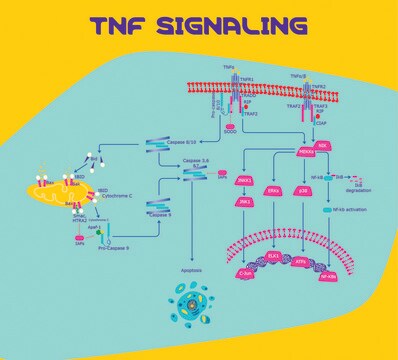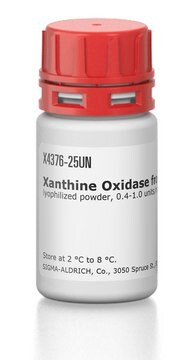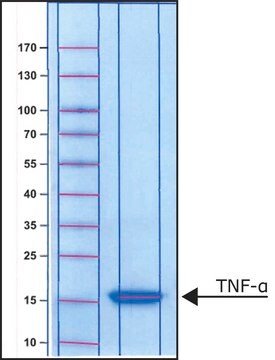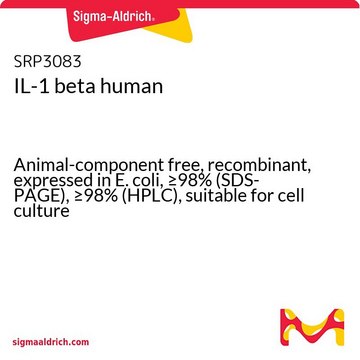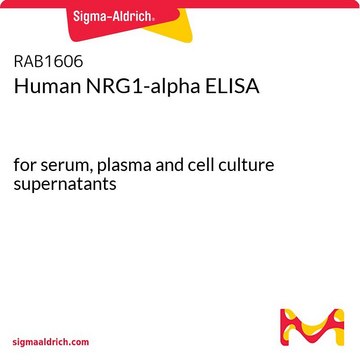推荐产品
产品名称
Tumor Necrosis Factor-β human, TNF-β, recombinant, expressed in E. coli, powder, suitable for cell culture
生物源
human
品質等級
重組細胞
expressed in E. coli
化驗
>95% (SDS-PAGE)
形狀
powder
效力
4-20 pg/mL Activity
品質
endotoxin tested
分子量
protein 18.8 kDa
包裝
pkg of 10 μg
儲存條件
avoid repeated freeze/thaw cycles
技術
cell culture | mammalian: suitable
雜質
≤1 EU/μg
UniProt登錄號
儲存溫度
−20°C
基因資訊
human ... LTA(4049) , TNFSF13B(10673)
生化/生理作用
Tumor necrosis factor-β (TNF-β), also known as lymphotoxin-α (LT-α) and cytotoxic factor, is a 25 kDa glycoprotein that is tightly regulated by lymphocytes. TNF-β and TNF-α share a 28% amino acid sequence identity, and as soluble forms, both can exist in solution as homotrimers, activate the same TNF receptors (TNFR1 and TNFR2) and elicit many of the same bioactivities. Unlike TNF-α, TNF-β can also form heterotrimers with one or two molecules of the related membrane-bound lymphotoxin-β (LT-β). Reportedly, LTα1/β2, the predominant heterotrimer, binds and activates only the LT-β receptor, LT-βR. The other heterotrimer, LT-α2/β1 binds and activates TNFR1 and TNFR2 but not LT-βR. TNF-β is expressed in activated T, B and NK cells and in certain transformed cells. Genes for TNF-β, LT-β and TNF-α are tightly linked near each other within the MHC. TNF-β appears to play many of the same biological roles as TNF-α, but the membrane-bound form with LT-β is critical for normal lymphoid organ development. Genetic polymorphisms in TNF-α and TNF-β have been linked to certain pathological conditions, including myasthenia gravis. At the amino acid level, human and mouse TNF-β are 74% homologous and human and mouse LT-β are 80% homologous.
Tumor necrosis factor-β, also known as lymphotoxin-α (LT-α) and cytotoxic factor, is a 25 kDa glycoprotein that is tightly regulated by lymphocytes.
外觀
lyophilized from a 0.2 μm filtered solution in PBS with BSA as a carrier protein
分析報告
The biological activity is measured in a cytotoxicity assay using the TNF-suspectible murine L929 cell line in the presence of actinomycin D.
儲存類別代碼
11 - Combustible Solids
水污染物質分類(WGK)
WGK 3
閃點(°F)
Not applicable
閃點(°C)
Not applicable
個人防護裝備
Eyeshields, Gloves, type N95 (US)
H Gutman et al.
International journal of molecular medicine, 8(2), 199-203 (2001-07-11)
Tumor necrosis factor (TNF) causes cell necrosis in vivo by damaging the endothelium of the neovasculature. However, its mechanism of action is not well understood. We hypothesized that TNF affects the tumor microenvironment even before neovascularization occurs, thereby increasing lymphocyte
O Jónasdóttir et al.
APMIS : acta pathologica, microbiologica, et immunologica Scandinavica, 109(11), 781-786 (2002-03-20)
Wegener's granulomatosis (WG) is a systemic inflammatory disease with vasculitis as the key feature. Abnormal expression of tumour necrosis factor alpha (TNFalpha) is considered of prime pathogenic importance in several inflammatory diseases. The effects of TNFa are mediated by TNF
我们的科学家团队拥有各种研究领域经验,包括生命科学、材料科学、化学合成、色谱、分析及许多其他领域.
联系技术服务部门